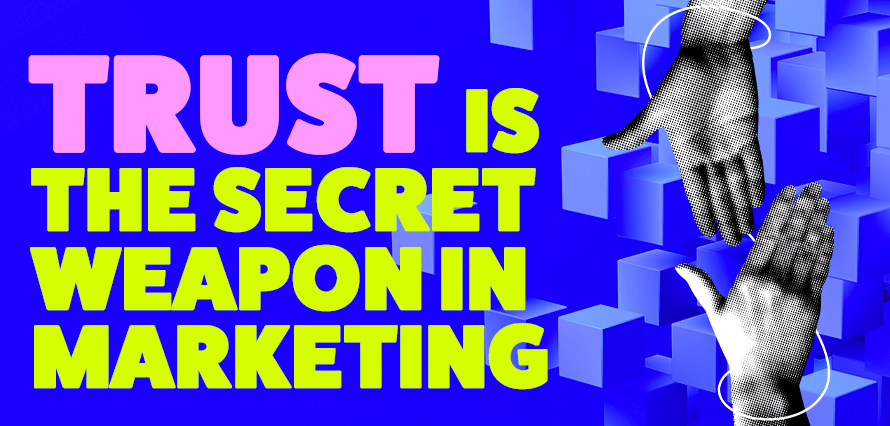February 17, 2025

You can have the best campaign, the smartest strategy, and the flashiest creative, but if your audience doesn’t trust you, none of it matters.
In B2B marketing, trust is everything. It’s what turns a casual buyer into a loyal customer, a one-off project into a long-term partnership, and a client into an advocate. And yet, it’s also one of the most overlooked aspects of marketing strategy.
This blog is based on a live session our CEO, Katy Howell, hosted with Remeny Armitage, the founder of Brilliant and Human.
During our conversation, we explored insights from the Brilliant and Human Report, a study based on real client feedback that uncovers the biggest trust gaps in marketing and business relationships.
The report highlights where businesses fall short in communication, consistency, and proactive engagement. And, more importantly, how to fix it. If you care about making your marketing work harder, this is the kind of research you need to be paying attention to.
The numbers don’t lie
99% of B2B decision-makers say trust is crucial when choosing a supplier (Mercuri, 2024).
But here’s the problem. Trust in businesses is declining. In the UK alone, trust in brands has dropped by 9%, and in the US, it’s fallen to just 48% (CBC, 2024). Clients are more sceptical, more cautious, and less willing to take risks.
So what’s going wrong? And more importantly, how can marketing fix it?
Trust isn’t built in a single campaign or through a one-off touchpoint. It’s built over time; through every interaction a brand has with its audience.
Yet, 56% of clients feel frustrated by inconsistent messaging across platforms (Brilliant and Human Report). That inconsistency makes brands look unreliable and makes clients second-guess their choices.
Marketing’s role in building trust
Marketing’s job isn’t just to get attention; it’s to reinforce credibility, demonstrate expertise, and prove reliability. That means:
- Consistent messaging. No mixed signals, no vague promises, just clear, honest communication
- Showing expertise. Clients trust brands that prove they know their stuff, not those that just say they do
- Human connection. The brands that win are the ones that feel real, not robotic
“Trust isn’t just one thing – it’s this all-encompassing feeling built from every single interaction.” – Katy Howell
The biggest trust-killer is failing to understand your clients
Want to break trust with your clients fast? Make it obvious that you don’t understand them.
According to the Brilliant and Human Report, 58% of clients feel their service providers don’t understand their business well enough to deliver strategic value.
Even worse, 62% of clients think their services are reactive rather than proactive. If clients don’t feel understood, they won’t trust you to guide them.
Marketing can fix this by:
- Investing in real customer research. Not assumptions, not guesswork, but actual conversations with clients
- Proactively addressing needs. Clients don’t just want solutions to current problems; they want partners who anticipate challenges before they happen
- Demonstrating deep industry knowledge
“One of the biggest trust-breakers is poor communication. Businesses fail to communicate consistently, and they fail to be proactive.” – Remeny Armitage
Oh, and you can also discover how social builds trust with B2B buyers in more detail in this blog
Thought leadership is a trust accelerator
Speaking of expertise, let’s talk about thought leadership. Too many brands treat it like a box to tick. Churning out generic blog posts or LinkedIn updates with nothing new to say. But done right, thought leadership is one of the fastest ways to build trust.
49% of clients feel agencies lack real thought leadership that addresses their industry challenges (Brilliant and Human Report).
That’s a massive gap
and a massive opportunity.
Good thought leadership isn’t just about publishing content. It’s about, saying something original, being specific, and leading conversations, not following trends
“Thought leadership isn’t just a vanity exercise – it’s a trust builder.” – Katy Howell
Marketing doesn’t stop after the sale
One of the biggest mistakes businesses make is treating marketing as a lead-generation tool and nothing more. The reality is, marketing should be working just as hard to keep clients as it does to win them.
62% of clients say agencies are too reactive instead of proactively guiding them (Brilliant and Human Report). That’s a failure of relationship marketing.
Trust isn’t something you build once and then forget about. It needs to be reinforced consistently—especially with existing clients.
“If marketing is just a one-and-done activity (just getting someone across the line) you’re failing your business.” – Katy Howell
Marketing’s biggest opportunity
Trust isn’t a soft metric. It’s the difference between clients who stay and clients who churn.
And right now, there’s a huge opportunity for marketers who get this right.
Brands that nail trust-building are the ones that will win in the long run. So here’s the challenge: stop thinking about marketing as a short-term play to grab attention. Start using it as a long-term strategy to build credibility, relationships, and real client advocacy.
“Trust isn’t built in a day—it’s built in every interaction, every post, every conversation.” – Remeny Armitage
BTW Remeny is an expert in customer and client relationships, helping businesses truly understand what their clients think, feel, and need. She works with agencies and professional service firms to turn clients into loyal advocates through deeper insight and meaningful engagement. You can sign up for the report at https://bit.ly/SendMeBrillReport